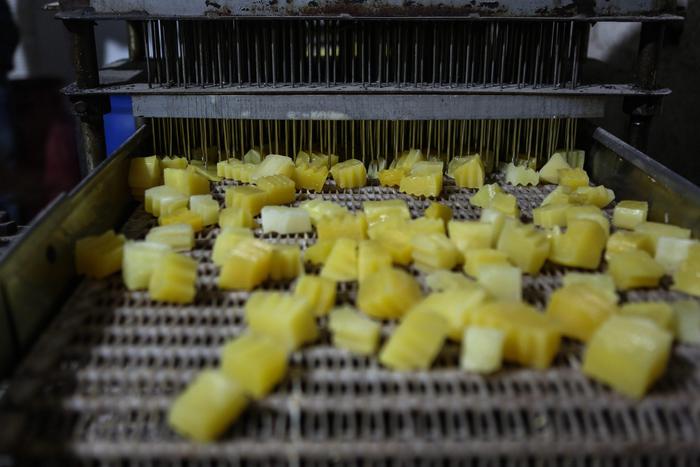Stéphanie Mathern unscrews the red lid of a small cylindrical container - a “topette” in her jargon - and reveals a pasty and orange mixture: “It's orange concentrate that has just arrived from Brazil in a truck. -cistern ”, explains the R&D manager of Jus de fruits d'Alsace, one of the two largest French fruit juice manufacturers, which produces mainly for private labels.
"And to get it, it's simple," she continues, slicing oranges and extracting their precious juice using her personal juicer.
Our suppliers produce juice and transform it into concentrate by evaporation.
"
Find all the episodes of "Food Checking"
The result is six times smaller and is easily transported across the Atlantic, before being rehydrated, pasteurized and packaged on site.
“70% of the oranges or orange concentrates we use come from Brazil and 30% from Spain or the Mediterranean basin.
The Brazilian origin is softer and the Spanish origin more acidic, explains the agronomist.
In fact, it is often the mixture of the two which makes it possible to obtain the most harmonious mixture ”, continues the person in charge.
Among the plethora of orange juice in supermarkets, that made from concentrate only represents 17% of sales volumes.
Is it the fault of the nutritionists if this product occupies such a small place in the shelves?
Morning essentials newsletter
A tour of the news to start the day
Subscribe to the newsletterAll newsletters
To prepare this report, we sought advice from several of these health professionals: all of them immediately decried this low-end product because, they explained, the manufacturers add sugar to it.
And yet, it is false: a European directive has prohibited it since 2012. “Orange juice is an interesting source of vitamin C, corrects nutritionist Pauline Budinsky.
For the proper functioning of the organism, we need vitamin C. "
And continue by reading the nutritional information table on the back of a carton of orange juice made from Carrefour concentrate packaged by Jus de fruits d'Alsace: “In a 200 ml glass, we have 40 mg of vitamin. C. This represents 50% of daily needs, so it is not negligible.
The negative point is that in a glass, we have 17 g of sugar.
According to the WHO, you are supposed to need 25 g of sugar per day, so if you drink two glasses of it you are already above the recommendations.
"
The same goes for the pure Carrefour juice presented at room temperature, composed of pressed and pasteurized oranges, without a concentration or rehydration step;
as well as for the pure juice stored in the fresh section.
“From a nutritional point of view, the three are equal,” observes Pauline.
It's the taste and the price that can make the difference.
"
For this report, we have chosen to rule out orange nectars, sometimes enriched with sugar but so small (6% of sales) that we did not find any in most of the stores visited.
Buy the seasonal fruits, and squeeze them!
Then, we asked Jessica Prealpato, the excellent pastry chef at the Alain Ducasse restaurant at the Plaza Athénée, to taste three products blindly, as well as a minute squeezed orange juice.
"This one is a little chemical," says the best pastry chef in the world 2020, blindfolded, of the pure juice from the fresh section.
It's acidic.
It really reminds me of a drug.
It should be noted here that glass does not contain, to our knowledge, any synthetic product.
The pure juice at the ambient shelf turns out to be less acidic.
What about juice from concentrate?
"Maybe it reminds me of orange juice more now."
But really unripe oranges.
"
Logical: as this juice contains less Spanish orange, it turns out to be less acidic.
And the last ?
"These are squeezed oranges!"
»She admits.
In the standings, the minute squeezed orange juice is the big winner.
But it takes a budget, for a liter, of 2.49 € of oranges and a lot of elbow grease.
“This one is really the only one I buy and drink,” comments the chef.
But the juice that arrives just after, surprise, turns out to be the cheapest of all the packaged products: juice from concentrate, at € 1.02 per liter.
Then come the pure juice from the ambient section (€ 1.68 / l) and the pure juice from the fresh section, the most expensive (€ 2.19 / l).
As long as you have time and a little bit of money, the best advice is undoubtedly that of the chef: "Buy oranges in season and drink the juice in season!"
It really provides the vitamins you need in the middle of winter.
"















